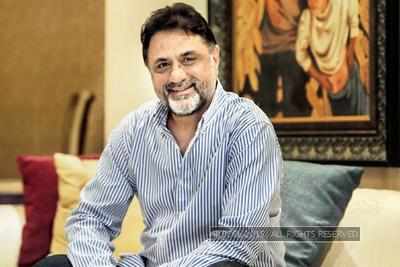- News
- entertainment
- hindi
- bollywood
- Harry Baweja: I am overwhelmed not by the money I made on Chaar Sahibzaade but by the respect it has given me
Trending
This story is from February 16, 2015
Harry Baweja: I am overwhelmed not by the money I made on Chaar Sahibzaade but by the respect it has given me
His latest animation film Chaar Sahibzaade has not just made money, but brought him respect from Sikhs around the world. It has completed 100 days in Canada, London, Delhi and Punjab and has been so successful that he is now making a trilogy of it. While he started working on the second part that will hit the theatres in the summer of 2016, he talks to Bombay Times about the challenges in making Chaar Sahibzaade, the blessings he has got as result of it and why he would never keep a dog at home.

Harry Baweja, 60, is a family person and emotional, but determined and gutsy. He is open and honest and can settle for being a bad negotiator, but does not like to compromise on his films.
He may not be as romantic as his wife Pammy would like him to be, but he loves her the most in the world. His latest animation film Chaar Sahibzaadehas not just made money, but brought him respect from Sikhs around the world.It has completed 100 days in Canada, London, Delhi and Punjab and has been so successful that he is now making a trilogy of it. While he started working on the second part that will hit the theatres in the summer of 2016, he talks to Bombay Times about the challenges in making Chaar Sahibzaade, the blessings he has got as result of it and why he would never keep a dog at home. Excerpts:
How did you come into films?
I come from a business family of Chandigarh, where my father was into the construction business and owned petrol pumps and we were pretty wealthy. He was a staunch Congress follower and the President of the Chandigarh Congress Pradesh committee. I lost my father when I was only 13 and was at that time studying in a boarding school. Had he lived, he could have probably become the Chief Minister. Right from when I was in school, I was interested in doing only theatre and dramatics. I later joined Department of Indian Theatre in Punjab University and started learning theatre formally. But being the eldest of the five kids, the responsibility of looking after my family was on me.
When I wanted to make my own film, I thus obviously wanted to make it with Mithun da as he was not just a big star, but he was also very fond of me. Manmohan Desai, Prakash Mehra would be on the set to sign him up and in all of that, I had to tell him to do my debut film. But he said he would do it, provided I waited for a year and of course, I did wait and he kept his commitment, though he could have easily backed out. We made Trinetra and it got a bumper opening. That was a time when Mithun da was having a release every week. But I was lucky as five films before Trinetra and ten films after that had not worked at the box office.
READ: Harry Baweja happy with reactions to Chaar Sahibzaade
Talk about working with Mithun Chakraborty?
He is a thorough gentleman. I signed him for a second film, but was telling my producer that we should not be signing him as Mithun da’s films were not working, so, I did not want the producer to lose his money. But he insisted we make a film with him only. I called Mithun dada requesting for his dates. And guess what he tells me in front of the producer when we met him? He said, ‘Harry, you know your work. If you make a film with me, you will lose your career. Don’t make it now, we will make it later.’ That is Mithun da. I then made Dilwale with Ajay Devgn that was a hit.
How did you think of Chaar Sahibzaade?
My hostel had been a Sikh convent. When you are in a hostel, you don’t have your parents, but you have teachers and God. Way back in 1976, I was doing a play for a convent institution, when I read the whole history of Jesus Christ and suggested that we make a play on him. Just after that, I thought why don’t I do a play on Sikh gurus. I started doing that, but the Khalistan movement was going on, so I decided against it. I couldn’t do it then, but that remained with me. I am very religious to the extent that I have a gurudwara at home and I wanted to do something to thank him, so, I decided to make a movie on the life of the gurus and wrote a letter to the SGPC (Shiromani Gurdwara Parbandhak Committee in Amritsar) in 2009 to seek their permission. Everyone thought that at the end of your career, you want to do something so stupid and put an end to your life. Who has come out of the SGPC office and got permission to make a film on Sikhism, but I was adamant and after making 80 trips to Amritsar managed to convince them. They had agreed that while I could not touch the 10 gurus, I was allowed to show the boys. But I had another challenge, animation in India had not worked so far. But I realised that it was not the fault of animation, but the content that had been put out. And Chaar Sahibzaade happened. I wrote the story and the screenplay. Right from Class III to VIII, I had gone to a gurudwara every day and had been taught Sikh history and gurbani daily for half an hour, so there was a lot of drilling that went into your system and you can’t forget that. After getting the permission, I visited all the historical places so that we could replicate them through animation. It is a story that all Sikhs have read in four pages in school and it touched a chord. We made it in Hindi and Punjabi with English subtitles and even dubbed it for the American market with an American accent so that the kids there could understand. I feel it’s the blessing of my guru that has made it the success it has become.
Listen to Chaar Sahibzaade songs on Gaana.com
Any feedback that has touched you post the release of the film?
Amongst all the religious places in India, the most closest to Guru Gobind Singh the saint as we call it, is Nanded in Maharashtra as that is where he passed away. That is where the names of the four boys is taken in the main ardaas. I met Babaji, the head priest of the gurudwara there, who is the only person allowed to go in that small room in which Guruji sat and passed away. He saw the trailer and gave us a box of sweets saying congratulations. It was difficult to believe it at that time. These saints never go to a theatre as religious heads are not supposed to go usually, but the film released and the sangat (his people) went to see it and came back and told him about it. He couldn’t resist it and went with a whole convoy to see it. He was overwhelmed. Seeing him, all the priests went to see it across gurudwaras in the country. He called us there and gave us the honour that only a few people have got and he said to me, ‘Do you know what you have done? When you praise a person, he feels very good. But you praise the children, the parent is more than happy. You have praised the children of Guru Gobind Singh. You don’t know how happy he will be.’ I cried. The film brings out the contribution and bravery of his children. Some kids saw the film and said to me, ‘I learnt how to love my brothers’ due to the bonding of the brothers in the film. I did not become a producer to make money. I became a producer to convenience my filmmaking. I had taken a calculated risk in this film and thought that even if one out of every ten Sikh in the world sees it, I will get my money back and that is exactly what has happened. I am relieved that it has not just done well at the box office, but has also been critically accepted. It’s not about the money that I have earned with Chaar Sahibzaade, but it’s the kind of respect that I have got, that is overwhelming.
For latest Bollywood updates follow us on Twitter >>> @TOIEntertain
For the latest in Bollywood news, like us on Facebook >>> TOIEntertain
WATCH: CHAAR SAHIBZAADE TRAILER
He may not be as romantic as his wife Pammy would like him to be, but he loves her the most in the world. His latest animation film Chaar Sahibzaadehas not just made money, but brought him respect from Sikhs around the world.It has completed 100 days in Canada, London, Delhi and Punjab and has been so successful that he is now making a trilogy of it. While he started working on the second part that will hit the theatres in the summer of 2016, he talks to Bombay Times about the challenges in making Chaar Sahibzaade, the blessings he has got as result of it and why he would never keep a dog at home. Excerpts:
How did you come into films?
I come from a business family of Chandigarh, where my father was into the construction business and owned petrol pumps and we were pretty wealthy. He was a staunch Congress follower and the President of the Chandigarh Congress Pradesh committee. I lost my father when I was only 13 and was at that time studying in a boarding school. Had he lived, he could have probably become the Chief Minister. Right from when I was in school, I was interested in doing only theatre and dramatics. I later joined Department of Indian Theatre in Punjab University and started learning theatre formally. But being the eldest of the five kids, the responsibility of looking after my family was on me.
My mother was not educated and could not read or write. But after all the relatives gave way, she took over the business. My father had died of hydrophobia. We had an Alsatian dog at home who had gone wrong. He would run away every night as he was not well, so, my father would lock him up every night in the bathroom. I was at home from the hostel that day, when my father returned from taking a morning walk with the dog. As he opened the main gate, the dog thought that he would again be locked again and he jumped at my dad on his neck and his saliva contacted with my dad’s mouth. We didn’t know that the dog had that disease, so, within a month, my dad got that disease too and died. I have never kept a dog after that as I am so scared. Life changed after dad. Mom could not cope up with the business and it did not do well. I was not cut out for it and found it too crude, even though I would go to college in the morning and to the brick lanes in the evening. I was happy only while doing theatre and started directing plays. I would come home with an award and my mother would say, ‘Throw it away.’ Finally, I had an arranged marriage, but told my wife Pammy before we got engaged that finally I wanted to go to Mumbai to make films. I had two children, got my two sisters married, saw my brothers settling down and decided to leave my wife and kids in Chandigarh to come to Mumbai to test the waters for myself. I had told them that I would try for six months and if I did not succeed, I would come back. I knew no one in Mumbai and now had two children also, but my wife stood by me. I never took financial help from my mother or my family as they all thought that I was doing something wrong and were, in fact, upset with my decision. Even when I had the chance to come to Mumbai earlier through a school trip, I did not come, but I would always tell my friends that I would be buried in Mumbai.
Anupam Kher was a batchmate from theatre in Chandigarh and I went straight to the set of Mahesh Bhatt, who was shooting for Saaransh at that time. I had a cousin in Chandigarh who was the distributor of Bollywood films in Punjab. I requested him to make a call to B Subhash to allow me to be his assistant. I assisted him for eight films, out of which five were with Mithun Chakraborty, who was the biggest star at that time.
When I wanted to make my own film, I thus obviously wanted to make it with Mithun da as he was not just a big star, but he was also very fond of me. Manmohan Desai, Prakash Mehra would be on the set to sign him up and in all of that, I had to tell him to do my debut film. But he said he would do it, provided I waited for a year and of course, I did wait and he kept his commitment, though he could have easily backed out. We made Trinetra and it got a bumper opening. That was a time when Mithun da was having a release every week. But I was lucky as five films before Trinetra and ten films after that had not worked at the box office.
READ: Harry Baweja happy with reactions to Chaar Sahibzaade
Talk about working with Mithun Chakraborty?
He is a thorough gentleman. I signed him for a second film, but was telling my producer that we should not be signing him as Mithun da’s films were not working, so, I did not want the producer to lose his money. But he insisted we make a film with him only. I called Mithun dada requesting for his dates. And guess what he tells me in front of the producer when we met him? He said, ‘Harry, you know your work. If you make a film with me, you will lose your career. Don’t make it now, we will make it later.’ That is Mithun da. I then made Dilwale with Ajay Devgn that was a hit.
How did you think of Chaar Sahibzaade?
My hostel had been a Sikh convent. When you are in a hostel, you don’t have your parents, but you have teachers and God. Way back in 1976, I was doing a play for a convent institution, when I read the whole history of Jesus Christ and suggested that we make a play on him. Just after that, I thought why don’t I do a play on Sikh gurus. I started doing that, but the Khalistan movement was going on, so I decided against it. I couldn’t do it then, but that remained with me. I am very religious to the extent that I have a gurudwara at home and I wanted to do something to thank him, so, I decided to make a movie on the life of the gurus and wrote a letter to the SGPC (Shiromani Gurdwara Parbandhak Committee in Amritsar) in 2009 to seek their permission. Everyone thought that at the end of your career, you want to do something so stupid and put an end to your life. Who has come out of the SGPC office and got permission to make a film on Sikhism, but I was adamant and after making 80 trips to Amritsar managed to convince them. They had agreed that while I could not touch the 10 gurus, I was allowed to show the boys. But I had another challenge, animation in India had not worked so far. But I realised that it was not the fault of animation, but the content that had been put out. And Chaar Sahibzaade happened. I wrote the story and the screenplay. Right from Class III to VIII, I had gone to a gurudwara every day and had been taught Sikh history and gurbani daily for half an hour, so there was a lot of drilling that went into your system and you can’t forget that. After getting the permission, I visited all the historical places so that we could replicate them through animation. It is a story that all Sikhs have read in four pages in school and it touched a chord. We made it in Hindi and Punjabi with English subtitles and even dubbed it for the American market with an American accent so that the kids there could understand. I feel it’s the blessing of my guru that has made it the success it has become.
Listen to Chaar Sahibzaade songs on Gaana.com
Any feedback that has touched you post the release of the film?
Amongst all the religious places in India, the most closest to Guru Gobind Singh the saint as we call it, is Nanded in Maharashtra as that is where he passed away. That is where the names of the four boys is taken in the main ardaas. I met Babaji, the head priest of the gurudwara there, who is the only person allowed to go in that small room in which Guruji sat and passed away. He saw the trailer and gave us a box of sweets saying congratulations. It was difficult to believe it at that time. These saints never go to a theatre as religious heads are not supposed to go usually, but the film released and the sangat (his people) went to see it and came back and told him about it. He couldn’t resist it and went with a whole convoy to see it. He was overwhelmed. Seeing him, all the priests went to see it across gurudwaras in the country. He called us there and gave us the honour that only a few people have got and he said to me, ‘Do you know what you have done? When you praise a person, he feels very good. But you praise the children, the parent is more than happy. You have praised the children of Guru Gobind Singh. You don’t know how happy he will be.’ I cried. The film brings out the contribution and bravery of his children. Some kids saw the film and said to me, ‘I learnt how to love my brothers’ due to the bonding of the brothers in the film. I did not become a producer to make money. I became a producer to convenience my filmmaking. I had taken a calculated risk in this film and thought that even if one out of every ten Sikh in the world sees it, I will get my money back and that is exactly what has happened. I am relieved that it has not just done well at the box office, but has also been critically accepted. It’s not about the money that I have earned with Chaar Sahibzaade, but it’s the kind of respect that I have got, that is overwhelming.
For latest Bollywood updates follow us on Twitter >>> @TOIEntertain
For the latest in Bollywood news, like us on Facebook >>> TOIEntertain
WATCH: CHAAR SAHIBZAADE TRAILER
End of Article
FOLLOW US ON SOCIAL MEDIA









